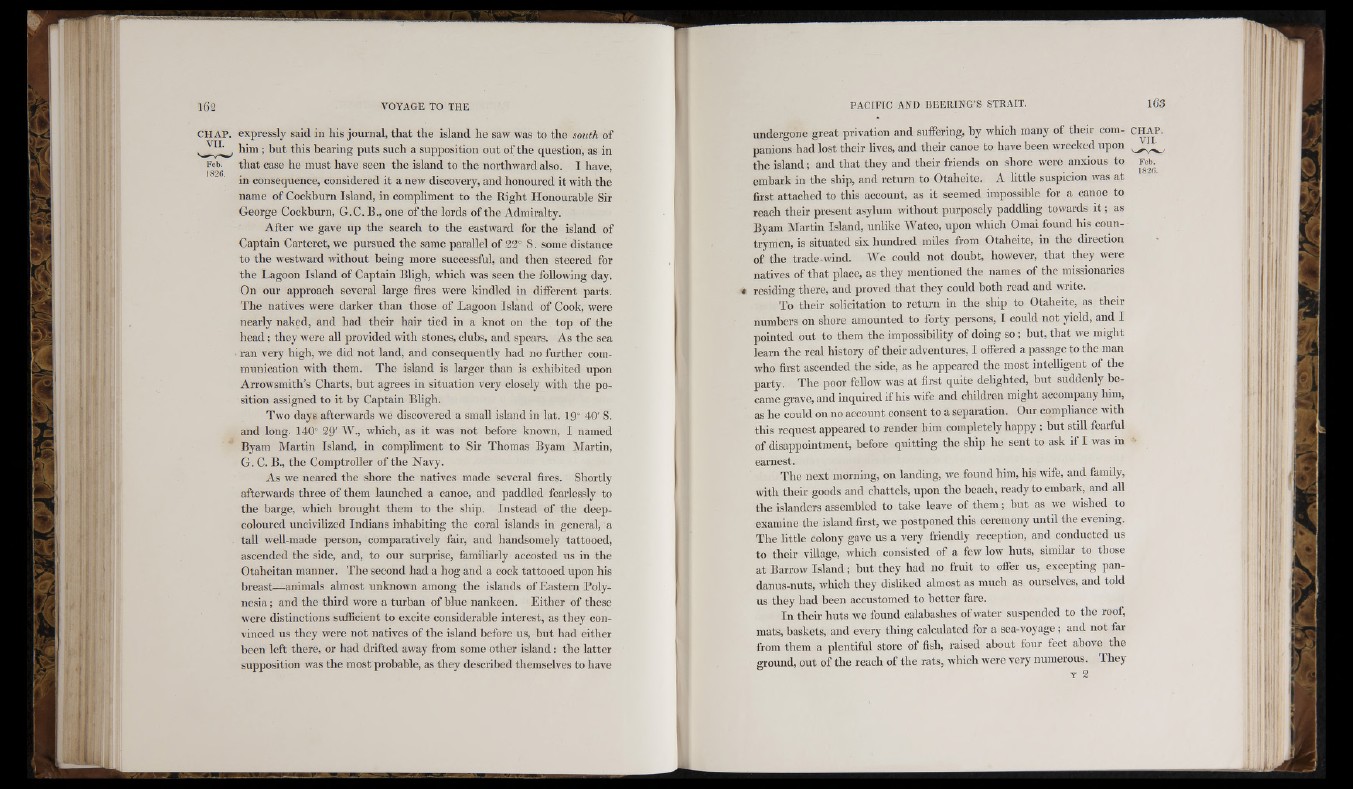
Cli AP. expressly said in his journal, that the island he saw was to the south of
Feb.
1826.
him ; but this bearing puts such a supposition out of the question, as in
that case he must have seen the island to the northward also. I have,
in consequence, considered it a new discovery, and honoured it with the
name of Cockburn Island, in compliment to the Right Honourable Sir
George Cockburn, G.C. B., one of the lords of the Admiralty.
After we gave up the search to the eastward for the island of
Captain Carteret, we pursued the same parallel of 22° S . some distance
to the westward without being more successful, and then steered for
the Lagoon Island of Captain Bligh, W'hich was seen the following day.
On our approach several large fires were kindled in different parts.
The natives were darker than those of Lagoon Island of Cook, were
nearly naked, and had their hair tied in a knot on the top of the
head; they w’ere all provided with stones, clubs, and spears. As the sea
ran very high, we did not land, and consequently had no further communication
with them. The island is larger than is exhibited upon
Arrowsmith’s Charts, but agrees in situation very closely with the position
assigned to it by Captain Bligh.
Two days afterwards we discovered a small island in lat. 19° 40' S.
and long. 140° 29' YY"., w’hich, as it was not before known, I named
Byam Martin Island, in compliment to Sir Thomas Byam Martin,
G. C. B., the Comptroller of the Navy.
As we neared the shore the natives made several fires. Shortly
afterwards three of them launched a canoe, and paddled fearlessly to
the barge, w'hich brought them to the ship. Instead of the deep-
coloured uncivilized Indians inhabiting the coral islands in general, a
tall well-made person, comparatively fair, and handsomely tattooed,
ascended the side, and, to our surprise, familiarly accosted us in the
Otaheitan manner. The second had a hog and a cock tattooed upon his
breast— animals almost unknown among the islands of Eastern Polynesia;
and the third wore a turban of blue nankeen. Either ofthese
w’cre distinctions sufficient to excite considerable interest, as they convinced
us they were not natives of the island before us, but had either
been left there, or had drifted away from some other Island: the latter
supposition was the most probable, as they described themselves to have
undergone great privation and suffering, by which many UUAAi-l O ' J V of their com- C H A P .
panions had lost their lives, and their canoe to have been wrecked npon
the island; and that they and their friends on shore w’ere anxious to
embark in the ship, and return to Otaheite. A little suspicion was at
first attached to this account, as it seemed impossible for a canoe to
reach their present asylum without purposely paddling towards i t ; as
Byam Martin Island, unlike YVateo, upon w’hich Omai found his countrymen,
is situated six hundred miles from Otaheite, in the direction
of the trade-wind. YY"e could not doubt, however, that they were
natives of that place, as they mentioned the names of the missionaries
residing there, and proved that they could both read and write.
To their solicitation to retm-n in the ship to Otaheite, as their
numbers on shore amounted to forty persons, 1 could not yield, and I
pointed out to them the impossibility of doing s o ; but, that we might
learn the real history of their adventures, I offered a passage to the man
who first ascended the side, as he appeared the most intelligent of the
party. The poor feUow was at first quite delighted, but suddenly became
grave, and inquired if his wife and children might accompany him,
as he could on no account consent to a separation. Our compliance with
this request appeared to render him completely happy ; but still fearful
of disappointment, before quitting the ship he sent to ask if I was in
earnest.
The next morning, on landing, we found him, his wife, and family,
with their goods and chattels, upon the beach, ready to embark, and all
the islanders assembled to take leave of them; hut as we wished to
examine the island first, w'e postponed this ceremony until the evening.
The little colony gave us a very friendly reception, and conducted us
to their village, w'hich consisted of a few low huts, similar to those
at Barrow Island; but they had no fruit to offer us, excepting pan-
danus-nuts, which they disliked almost as much as ourselves, and told
us they had been accustomed to better fare.
In their huts we found calabashes of water suspended to the roof,
mats, baskets, and every thing calculated for a sea-voyage; and not far
from them a plentiful store of fish, raised about four feet above the
ground, out of the reach of the rats, which were very numerous. They
Y 2
vn.
Feb.
1826.
|i il